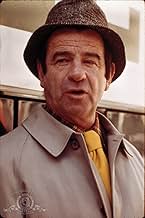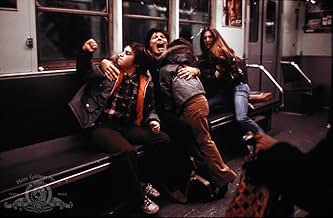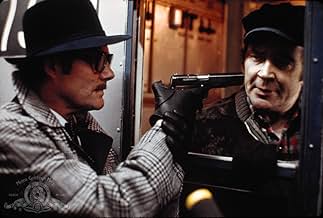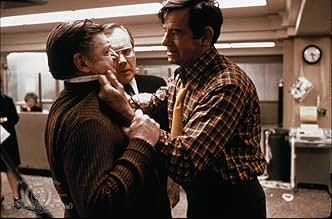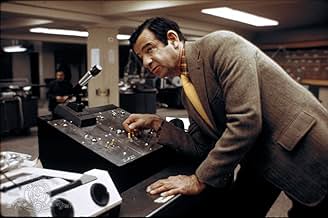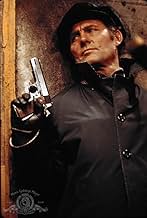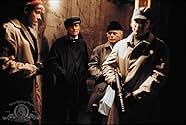En Nueva York, unos hombres armados secuestran un vagón del metro y exigen un rescate por los pasajeros. Aunque lo paguen, ¿cómo pueden escapar?En Nueva York, unos hombres armados secuestran un vagón del metro y exigen un rescate por los pasajeros. Aunque lo paguen, ¿cómo pueden escapar?En Nueva York, unos hombres armados secuestran un vagón del metro y exigen un rescate por los pasajeros. Aunque lo paguen, ¿cómo pueden escapar?
- Nominada a2premios BAFTA
- 3 nominaciones en total
Kenneth McMillan
- Borough Commander
- (as Kenneth Mc Millan)
- Dirección
- Guionistas
- Todo el elenco y el equipo
- Producción, taquilla y más en IMDbPro
Opiniones destacadas
I am biased a little with this film to begin with, as I live in NYC and am a big subway fan. So a gritty 70's flick that takes place in a NYC subway sounds good to me! But the truth is, this film is a great film full of extremely talented actors with a dynamite story. Shaw and Matthau are the obvious stars with everyone else putting in a good co-starring role.
The story takes place on the "6" train no less, which happens to be my fave subway line! It was a great surprise when I found the DVD for only ten bucks, I would have paid a normal price. And the quality of the DVD transfer is VERY nice. The film, though a bit brutal sometimes, even has some decent humor, even the ending is kinda funny, but perfect. I recently watched this on TV, just to compare the two versions and see where all the cuts and edits were. You can't go wrong with this film.
The story takes place on the "6" train no less, which happens to be my fave subway line! It was a great surprise when I found the DVD for only ten bucks, I would have paid a normal price. And the quality of the DVD transfer is VERY nice. The film, though a bit brutal sometimes, even has some decent humor, even the ending is kinda funny, but perfect. I recently watched this on TV, just to compare the two versions and see where all the cuts and edits were. You can't go wrong with this film.
A group of criminals highjack a subway train and demand $1 million from New York City. Transit cop, Lt. Garber tries to work the situation out, but it seems the gang have planned everything to the second and are running the show. Garber tries to get one step ahead of the gang.
Of course now everyone knows this film because of the supposed connection to Reservoir Dogs, in that the criminals are colour coded instead of names. However even without this cult reference this film deserves to be watched and enjoyed. The story exists on two levels. First we have the setup it also acknowledges that it is the usual disaster movie setup .the majority of characters are listed in the credits as stereotypes instead of people (ie, `the pimp' `the junkie' etc). However this is not a weakness as the thriller story is solid enough to carry the film. It isn't all action but it's very tense and interesting. What really tops it off is the thick vein of humour that runs through it mostly coming from Matthau.
Matthau shows how wonderful he is and how he manages to do well in so many different film styles. His world-weary act is great and his Brooklyn accent is pushed to the fore. Roberts Shaw is also good, but has less of a character and is working hard to sound English. The cast is actually deep in faces we have an almost unrecognisable Elizondo, Woody Allen actor Tony Roberts, a fantastic Mayor from Wallace and Jerry Stiller (Ben's dad), who doesn't look much older today than he did then!
Overall this is very enjoyable, but it is made by Matthau. The thriller plot stands up well despite the lack of modern fireworks. A cult classic in the making.
Of course now everyone knows this film because of the supposed connection to Reservoir Dogs, in that the criminals are colour coded instead of names. However even without this cult reference this film deserves to be watched and enjoyed. The story exists on two levels. First we have the setup it also acknowledges that it is the usual disaster movie setup .the majority of characters are listed in the credits as stereotypes instead of people (ie, `the pimp' `the junkie' etc). However this is not a weakness as the thriller story is solid enough to carry the film. It isn't all action but it's very tense and interesting. What really tops it off is the thick vein of humour that runs through it mostly coming from Matthau.
Matthau shows how wonderful he is and how he manages to do well in so many different film styles. His world-weary act is great and his Brooklyn accent is pushed to the fore. Roberts Shaw is also good, but has less of a character and is working hard to sound English. The cast is actually deep in faces we have an almost unrecognisable Elizondo, Woody Allen actor Tony Roberts, a fantastic Mayor from Wallace and Jerry Stiller (Ben's dad), who doesn't look much older today than he did then!
Overall this is very enjoyable, but it is made by Matthau. The thriller plot stands up well despite the lack of modern fireworks. A cult classic in the making.
There are many disappointing action pictures out there – this is not one of them. The genius of the film is there is no wasted motion. The picture starts right with the plot – no introduction or character development. The characters are allowed to develop as the plot moves along.
Which brings us to pacing – the pacing in this picture is excellent. It moves right along and never stops, never slows, never goes too fast. This is the strongest element of its success.
Another strength is its economy of motion. Many action pictures bore us with unneeded car chase scenes, shoot-em-ups, explosions and other mayhems that are used as filler when true creativity comes up short. This film needs none of that. Only that which is necessary is shown. Only that which needs speaking is spoken. This film is deftly written and crafted with great economy and this underpins the excellent pacing. It moves right along because there is no wasted motion as there is in most other action pictures.
This does not mean there is no action, there is fabulous action, but only such action as is necessary to move the plot along. There is no action simply to occupy time until the requisite 90 minutes are up.
The directing is equally economical. No fancy shots, shaky cameras, or special effects – just good, straight forward directing.
I doubt this picture could be made today for the above reasons. The script readers would reject it for 'lack of development'; 'not enough action'; 'no romantic interest'; and all the other brainless formulas script readers dole out. The producers would demand 'more action' and 'camera work' from the directors. And, of course, a romantic interest (in some state of undress) would have to be shoe horned in.
Film students should study this picture. From it they will learn that brevity is a virtue and mindless formulas are just that - mindless.
Which brings us to pacing – the pacing in this picture is excellent. It moves right along and never stops, never slows, never goes too fast. This is the strongest element of its success.
Another strength is its economy of motion. Many action pictures bore us with unneeded car chase scenes, shoot-em-ups, explosions and other mayhems that are used as filler when true creativity comes up short. This film needs none of that. Only that which is necessary is shown. Only that which needs speaking is spoken. This film is deftly written and crafted with great economy and this underpins the excellent pacing. It moves right along because there is no wasted motion as there is in most other action pictures.
This does not mean there is no action, there is fabulous action, but only such action as is necessary to move the plot along. There is no action simply to occupy time until the requisite 90 minutes are up.
The directing is equally economical. No fancy shots, shaky cameras, or special effects – just good, straight forward directing.
I doubt this picture could be made today for the above reasons. The script readers would reject it for 'lack of development'; 'not enough action'; 'no romantic interest'; and all the other brainless formulas script readers dole out. The producers would demand 'more action' and 'camera work' from the directors. And, of course, a romantic interest (in some state of undress) would have to be shoe horned in.
Film students should study this picture. From it they will learn that brevity is a virtue and mindless formulas are just that - mindless.
The Taking of Pelham One Two Three is one of those films plundered by movie magpie Quentin Tarantino, the director stealing the whole 'criminals with colours instead of names' idea for his debut Reservoir Dogs. It's easy to see why Pelham would appeal to QT: it's a gritty '70s thriller with a cool cult following, focusing on a group of violent ne'er-do-wells who carry out a daring hijack on a New York subway train. The dialogue is snappy, the cast is excellent, and David Shire's music is big, bold, brassy and badass.
Leading the hijackers is Robert Shaw, whose cold, calculating Mr. Blue is truly chilling; on the side of the law is Transit Police Lt. Zachary Garber, played by Walter Matthau, whose job it is to converse with the criminals whilst trying to figure out who they are and how they plan to make their escape. Much of the movie consists of exchanges of dialogue between the two men, but don't make the mistake of thinking this is a dull blab-fest: the tension runs high throughout, the race to deliver the ransom money against the clock being a particularly exciting highlight. And with one of the hijackers a dangerous loose cannon (Hector Elizondo's Mr. Grey, surely the inspiration for Michael Madsen's Mr. Blonde), the potential for the loss of innocent life is ever present.
A thrilling final act sees the train speeding out of control with the terrified passengers still on board, the gang having disembarked between stations. Meanwhile, Garber and his men tighten the net, and one-by-one the hijackers pay for their crime, with one death proving very shocking indeed. The fun continues right up to the final frame, an amusing ending that is nothing to be sneezed at.
Leading the hijackers is Robert Shaw, whose cold, calculating Mr. Blue is truly chilling; on the side of the law is Transit Police Lt. Zachary Garber, played by Walter Matthau, whose job it is to converse with the criminals whilst trying to figure out who they are and how they plan to make their escape. Much of the movie consists of exchanges of dialogue between the two men, but don't make the mistake of thinking this is a dull blab-fest: the tension runs high throughout, the race to deliver the ransom money against the clock being a particularly exciting highlight. And with one of the hijackers a dangerous loose cannon (Hector Elizondo's Mr. Grey, surely the inspiration for Michael Madsen's Mr. Blonde), the potential for the loss of innocent life is ever present.
A thrilling final act sees the train speeding out of control with the terrified passengers still on board, the gang having disembarked between stations. Meanwhile, Garber and his men tighten the net, and one-by-one the hijackers pay for their crime, with one death proving very shocking indeed. The fun continues right up to the final frame, an amusing ending that is nothing to be sneezed at.
Modern tough-guy filmmakers like Quentin Tarentino acknowledge their debt to this pedal-to-the-metal thriller, directed by Joseph Sargent from John Godey's bestseller. Walter Matthau is a hoot as the savvy NY transit cop who's smarter than he looks, well-matched by Robert Shaw as the icy mercenary whose gang has hijacked a subway car for a one-million-dollar ransom.
This film's been imitated so often because its makers were really at the top of their game. Owen Roizman (THE FRENCH CONNECTION) handled the gritty location photography; scripter Peter Stone contributed terse, funny dialogue; scene-stealers like Martin Balsam, Jerry Stiller, Dick O'Neill and others made their roles indelible; and David Shire's percussive score set a standard for the genre.
The ending is classic. When you have Matthau as your star, this is how to end your movie.
This film's been imitated so often because its makers were really at the top of their game. Owen Roizman (THE FRENCH CONNECTION) handled the gritty location photography; scripter Peter Stone contributed terse, funny dialogue; scene-stealers like Martin Balsam, Jerry Stiller, Dick O'Neill and others made their roles indelible; and David Shire's percussive score set a standard for the genre.
The ending is classic. When you have Matthau as your star, this is how to end your movie.
¿Sabías que…?
- TriviaIn a TVO (Ontario, Canada) interview, the producer said that this film did terrific box office in New York, Toronto, London and Paris--all cities with subways--but was considered a flop in the rest of the world.
- ErroresThe relevant section of the Lexington Avenue Line includes curves sharp enough to have speed-controlled signals. As Mr. Green would have known, these cannot be cleared to green in advance of the train's arrival and will not clear if it is running away.
- Citas
Lt. Garber: [looking for the inspector] Inspector Daniels?
Inspector Daniels: [identifying himself] Daniels.
Lt. Garber: [realizing that Inspector Daniels is Black] Oh, I, uh, thought you were, uh, like a shorter guy or... I don't know what I thought.
- Créditos curiososAlthough many of the scenes in this film were taken on transit property, the New York City Transit Authority is not responsible for plot, story and characters portrayed. The Authority did not render technical advice and assistance.
- ConexionesEdited into Superman III (1983)
Selecciones populares
Inicia sesión para calificar y agrega a la lista de videos para obtener recomendaciones personalizadas
Detalles
- Fecha de lanzamiento
- País de origen
- Idiomas
- También se conoce como
- El tomar de Pelham uno dos tres
- Locaciones de filmación
- Gracie Mansion, Manhattan, Nueva York, Nueva York, Estados Unidos(mayor's home - exteriors)
- Productoras
- Ver más créditos de la compañía en IMDbPro
Taquilla
- Presupuesto
- USD 5,000,000 (estimado)
- Total a nivel mundial
- USD 357
Contribuir a esta página
Sugiere una edición o agrega el contenido que falta


